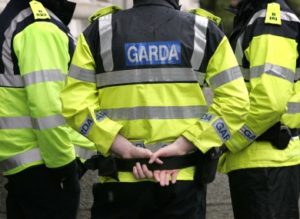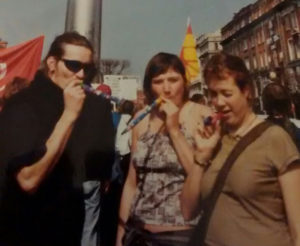Spycops in Ireland: Secret Report With More Questions Than Answers
 Shortly after the truth about undercover officer Mark Kennedy hit the headlines in January 2011, officials from many of the 11 countries he visited wanted answers. In Ireland, the Minister of Justice asked the police to write a report on his visits.
Shortly after the truth about undercover officer Mark Kennedy hit the headlines in January 2011, officials from many of the 11 countries he visited wanted answers. In Ireland, the Minister of Justice asked the police to write a report on his visits.
They refused to make it public but last week, following tenacious work by Ellen Coyne at the Times, it was released under Freedom of Information and The Canary published it in full.
In the report – little more than a fob-off letter – the Gardai don’t deny authorising Kennedy’s visits, and they defend their decision to keep it secret from their own government. Kennedy visited the country many times, committing human rights abuses, inciting action and getting arrested under a false identity.
The release of the report raises more questions than it answers. Who authorised his visits? What remit was he given? What oversight did they have on what he actually did? What did other British spycops do in Ireland?
MARK KENNEDY IN IRELAND
Mark Kennedy made at least five undercover visits to Ireland, taking on many different roles. In spring 2004 he was part of an info-tour raising awareness of the upcoming G8 meeting in Scotland and visited the Shell To Sea gas pipeline protest in Co Mayo. On Mayday 2004 he was part of a Dublin black bloc demo against an EU summit where he was attacked by police and needed hospital treatment. He was arrested, held for five hours and released.
In June 2004 he participated in the demonstration against George Bush’s visit to Dromoland Castle. He made at least two other visits to Ireland over the next two years, including acting as a trainer on a programme for anarchist activists later in 2004 on civil disobedience.

Mark Kennedy (left) and Sarah Hampton (right) in Dublin 2005
Kennedy was at the European Youth for Action’s April 2005 meeting in Co Clare to establish a European network of anti-war and peace activists.
He drove to Dublin in March 2006 to attend the Anarchist Bookfair. UK activists gave him publications to take which he reported as confiscated by UK border officials. He later went back to the Shell to Sea protest.
A second report – also a police self-investigation for the Ministry of Justice – was commissioned last year yet, despite demands from Irish parliamentarians, they are still keeping that one secret. Having hidden the truth from the government for so long, the Gardai are still keeping it from the public. Does it contain any answers about Kennedy’s activities? What are they hiding?
Even then, the two reports are focussed on Mark Kennedy’s visits to Ireland. There are even bigger questions. Which other British spycops came to Ireland to undermine campaigns and abuse citizens? Did any come from other countries? What exactly were they there for, and what did they end up doing?
NOT JUST KENNEDY
Although we only know about 18 officers of Britain’s political secret police – around 10% of the total – it’s already established that other officers visited the Republic; Mark Jenner, John Dines and Jim Boyling were also there, the four of them covering a period of 15 years.
Mark Jenner drove activists to Belfast and Derry in August 1995, and took part in street fighting when nationalists clashed with the loyalist Apprentice Boys of Derry march on 12 August. The Police Service of Northern Ireland say that police there were ‘completely blind’ to the presence of Met spycops, and that deploying them without training or oversight was ‘an act of madness’. Whilst in the North, Jenner also visited the Republic. It would be astonishing if, as the Gardai imply was the case with Kennedy, the Met informed them and got the visit authorised yet kept police in the North in the dark.
Jim Boyling visited Ireland in 1997 and is reported to have participated in the destruction of an experimental genetically modified crop. John Dines went to Ireland in late 1991/early 1992 during the final stages of his deployment.
HOW MUCH MORE?
Like Kennedy, Jenner, Boyling and Dines were the subjects of legal action by women they abused through relationships, something which the Met themselves have conceded was ‘a violation of the women’s human rights, an abuse of police power and caused significant trauma’. All but Boyling committed these abuses in Ireland, and Kennedy did so with several women.
This week, four of the women affected wrote to the Irish government asking
Who authorised these undercover operations in Ireland?
Do Irish police hold files on us, and when will we be given access to those files?
How does the Irish state justify foreign police officers having deceptive intimate relationships with women, in violation of our human rights and bodily integrity?
How many more UK police officers operated in Ireland and how many more women were abused by the police on Irish soil?
Did the Gardai know about this aspect of the British spycops’ activities? If so, they were complicit in human rights abuses. If not, it shows that their oversight was grossly incompetent and therefore warrants proper independent investigation.
Other questions should be answered to. When did it start? Is it still going on? Which Irish campaigns were targeted and stymied? Which citizens were abused?
Their cavalier approach to transparency and legality raises other questions. In the UK, spycops including Kennedy and Boyling engineered dozens of wrongful convictions for the people they spied on. Did the same thing happen in Ireland?
Even with the handful of officers exposed, it is clear there was long-term, systematic abuse. Most of the known officers went abroad. We can be sure that there are many, many more similar outrages and abuses committed by the as-yet unknown officers. The forthcoming British public inquiry will only look at actions in England and Wales.
NO EXCUSES, NO MORE DELAYS
We already know that the Gardai authorised foreign secret police to come to Ireland and spy on people, including inciting them to action, whilst there they committed human rights abuses, and it was kept secret from the government. The Gardai used their power in sinister and disturbing ways, facilitating numerous abusive officers. It beggars belief that anyone would dare to suggest a self-investigation into one officer would be sufficient, let alone accept it and fend off calls for anything more rigorous, yet this is what the Justice Minister is doing.
It shouldn’t take legal action by journalists to force admission of what’s already known. We shouldn’t rely on victims to do their own research into what was done to them and have pleas for answers go unanswered. If officials in government and police believed in justice they would be revealing the truth rather than hiding it.
